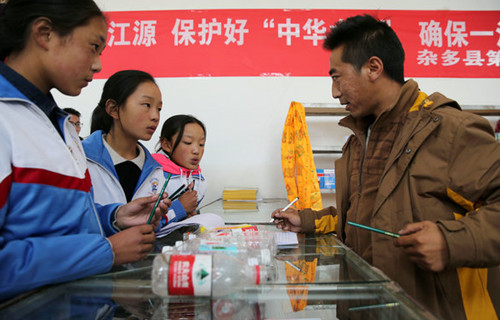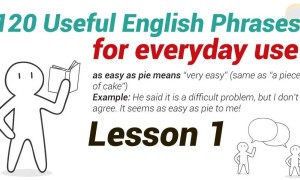导读:如果垃圾可以交换学习用品或者体育用品,你会不会投身这份公益事业呢?青海玉树藏族自治区杂多县的中小学,给我们开了个好头。

Two waste bottles for a pencil, 500 grams of unrecyclable waste for a notebook, and 15 kilograms of waste paper for a soccer ball or basketball-the equations are cemented in the mind of Nyima Dbangmo and all other students at the Second Middle School of Zadoi county,in Yushu Tibetan autonomous prefecture of Qinghai province.
在青海玉树藏族自治州杂多县第二中学,Nyima Dbangmo和所有其它同学牢记着如下等式:两个废瓶子等于一只铅笔,500克不可回收垃圾等于一个笔记本,15千克废纸等于一个足球或者篮球。
After every weekend, Nyima Dbangmo holds a plastic bag of trash, such as used water bottles, as she returns to school from home.
每周一,当Nyima Dbangmo从家中返回学校时,都会提着一个装满垃圾的塑料袋,里面装着水瓶这样的东西。
The garbage collected by the 14-year-old basically paid for her stationery items last semester, from pencils to notebooks, she says.
14岁的她说,这些收集起来的垃圾主要用于支付上学期的文具费用,文具小到铅笔,大到笔记本。
"It is habitual for us to pick up the garbage from the ground."
“我们都习惯从地上捡垃圾了。”
Since last March, a program called "Garbage for Stationery" has improved the campus environment and enhanced students’ awareness of the environment in six middle schools in Zadoi county along with ecology and environment protection classes.
自去年三月起,杂多县六所中学一项名为“变废为文具”的项目和相应的生态环境保护课,改善了校园环境,提高了学生的环保意识。
According to Nyigya, head of the county’s education department, poverty alleviation through education requires not only knowledge, but also cultivating a sense of responsibility among future generations to protect the fragile environment the local people rely on.
据县教育部门领导Nyigya说,通过教育扶贫,不仅仅需要知识,还需要培养下一代的责任感,以保护当地居民赖以为生的脆弱环境。
Zadoi county, whose economy depends on raising livestock, has an area of 30,000 square kilometers and an average altitude of 4,200 meters. It has a total population of 66,000, with more than 10,000 students registered in primary and middle schools.
杂多县的经济依赖于饲养牲畜,占地面积为30000平方公里,平均海拔高度为4200米。总人口为66000人,中小学在校注册生超过10000名。
Students have embraced the program since it started, according to Karma Chonyi, a teacher who is in charge of the program from the Second Middle School.
据掌管第二中学项目的老师Karma Chonyi说,自从项目开始,学生就积极拥护。
Every noon, Karma Chonyi shows up at a special office for the program to count the students’ gains and reward them accordingly.
每天中午,Karma Chonyi会出现在项目特别办公室里,清点学生的“战利品”,依此奖励他们。
The collected waste is disposed of by categories, with the help of local dump-managing staffers.
在当地垃圾管理人员的帮助下,收集的垃圾被分类处理。
There are about 40 items available for exchange at the office. The school, with donations from society, invested about 20,000 yuan ($3,000) in the program.
在办公室,有近40种物品可被用来交换。凭借社会捐助,学校向项目投资大约20000元(3000美金)。
"We’d pick up garbage such as water bottles along our way between home and school, and also bring garbage from home to school for exchange," says Nyima Dbangmo, who stays in a dorm during the weekdays and goes home on weekends.
Nyima Dbangmo是工作日住校,周末回家的一名学生,他说:“像水瓶这样的垃圾,我们都是在家和学校之间的路上捡的,我们还把家里的垃圾带回学校做交换。”
Nyima Dbangmo says both of her parents and even her younger brother have joined the project by collecting garbage for her.
Nyima Dbangmo说,他的父母和弟弟也通过捡垃圾加入了这个项目。
"It’s hard to find enough garbage for exchange now."
“现在,想找够垃圾做交换都不容易了。”
It takes her about one month to "save up" enough waste bottles to get something like a notebook, she says. The boy students sometimes work together and wait for a long time in order to get larger items, such as soccer balls and basketballs.
她说,她捡大约一个月的垃圾,才能攒够废瓶子,换个笔记本之类的东西。男孩子有时共同努力,为了获得像足球或者篮球这种大件物品,等待很长一段时间。







